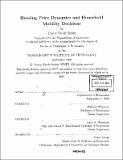| dc.contributor.advisor | William Wheaton and Jerry A. Hausman. | en_US |
| dc.contributor.author | Seslen, Tracey Nicole, 1977- | en_US |
| dc.contributor.other | Massachusetts Institute of Technology. Dept. of Economics. | en_US |
| dc.date.accessioned | 2007-12-07T19:18:42Z | |
| dc.date.available | 2007-12-07T19:18:42Z | |
| dc.date.copyright | 2003 | en_US |
| dc.date.issued | 2003 | en_US |
| dc.identifier.uri | http://dspace.mit.edu/handle/1721.1/17629 | en_US |
| dc.identifier.uri | http://hdl.handle.net/1721.1/17629 | |
| dc.description | Thesis (Ph. D.)--Massachusetts Institute of Technology, Dept. of Economics, 2003. | en_US |
| dc.description | Includes bibliographical references. | en_US |
| dc.description.abstract | The first chapter attempts to shed light on the role of housing price dynamics in mobility decisions, asking whether households respond to prices in a forward- or backward-looking manner, and the extent to which high leverage constrains moving behavior. On a broader level, the study tests whether price dynamics dominate non-market shocks as a force governing household mobility, given the importance of housing as an investment good and saving device. Using a 13 year sample from the Panel Study of Income Dynamics, I find that households are largely backward-looking in both their mobility and consumption decisions, and that non-market shocks play a significant role. Households show little or no response to equity constraints, and do not appear to time the market, despite significant forecastability in housing prices. These conclusions lend support to the notion of prices leading trading volume, but do not support the theoretical work of Stein (1995), which attributes mobility behavior to changes in equity constraints brought about by changes in housing prices. The second chapter uses data from the Retirement History Survey to measure the impact of property tax abatement programs on elderly homeownership decisions. Analysis using a competing risks framework, in which the decision to trade down is treated separately from the decision to end homeownership completely, shows striking differences in the impact of property taxes on each type of failure: for the elderly who choose to trade down, property taxes have a positive effect on the hazard of moving. Alternatively, property taxes have little impact on the tenure decision. Incorporating individual heterogeneity to correct for sample bias, to capture mover-stayer effects, and to account for correlation between property taxes and omitted variables, has little effect on the results. From an "ex post" perspective, the results of the analysis lead to the conclusion that property tax abatement programs have a small impact at best, and may be leading to undesirable redistributional outcomes. The final chapter employs data from the neighborhood clusters sample of the 1989 American Housing Survey and the wealth supplement of the 1989 Panel Study of Income Dynamics to study to distribution of wealth within US residential neighborhoods. Calculations using the Bourguignon decomposable inequality index show that wealth is more unequally distributed than income, and income more than housing wealth, at all levels of aggregation--neighborhoods, metropolitan areas, census regions, and the entire US. | en_US |
| dc.description.statementofresponsibility | by Tracey Nicole Seslen. | en_US |
| dc.format.extent | 104, [1] p. | en_US |
| dc.language.iso | eng | en_US |
| dc.publisher | Massachusetts Institute of Technology | en_US |
| dc.rights | M.I.T. theses are protected by copyright. They may be viewed from this source for any purpose, but reproduction or distribution in any format is prohibited without written permission. See provided URL for inquiries about permission. | en_US |
| dc.rights.uri | http://dspace.mit.edu/handle/1721.1/17629 | en_US |
| dc.rights.uri | http://dspace.mit.edu/handle/1721.1/7582 | |
| dc.subject | Economics. | en_US |
| dc.title | Housing price dynamics and household mobility decisions | en_US |
| dc.type | Thesis | en_US |
| dc.description.degree | Ph.D. | en_US |
| dc.contributor.department | Massachusetts Institute of Technology. Department of Economics | |
| dc.identifier.oclc | 54771279 | en_US |
